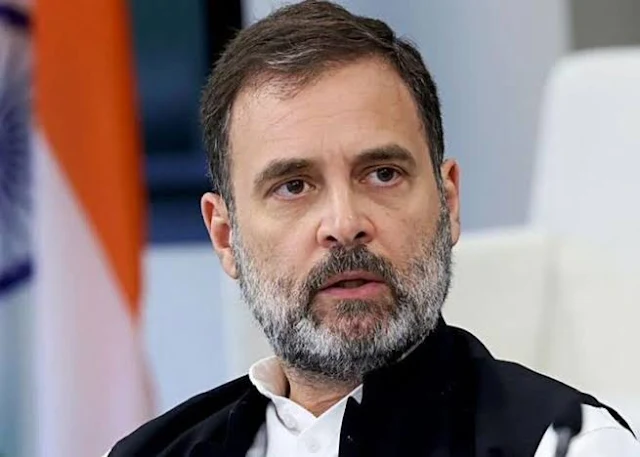Rahul Gandhi's focus on unemployment failing to resonate as youth gets disoriented, elders, women inundated with religion
India is a unique country where history is often learned through poets, storytellers, and, of course, politicians influenced by WhatsApp's narrative builders. These politicians often speak from behind the agendas set by their narrative framers. The aim of such "humor" is to humiliate opponents, energize their own cadre, and appear more "secular" or "nationalist," depending on their constituencies.
Ramji Lal Suman made sweeping generalizations, much like those who claim Maharana Pratap wielded an 80-kilogram spear or that his horse, Chetak, had lightning speed. Much of our history stems from the poetry of Subhadra Kumari Chauhan and others. Glorifying history is not confined to Rajputs alone; narrative framers and paid experts work tirelessly to energize their masters' cadre and keep them content.
This is a sad reality. When politicians fall into these traps, their cadres embrace it, ignoring pressing issues like poverty, inflation, and unemployment. Why aren't our youth taking to the streets to demand answers? Why is Rahul Gandhi's focus on unemployment failing to resonate? These are questions that demand serious reflection.
As I traveled through villages, I found that neither youth nor villagers spoke about poverty or unemployment. Everyone seemed engrossed in "reels" and online games. Every day, I hear stories of people earning vast sums through gaming and online trading. Everyone dreams of becoming a cricketer or a Bollywood star, fueling a relentless race. Foolishness is on the rise. Youths are following a path similar to the hip-hop culture popularized by MTV in the West, which influenced marginalized communities. Today, online gaming and reels have dangerously become addictive.
While the youth are becoming disoriented, the older generation and women are inundated with religion. Every day, there are bhajans, kirtans, paths, bhandaras, and yagyas. This seems to be the "homework" assigned by the current rulers. The chaos caused by the Mahakumbh still lingers, with train services from Gorakhpur, Kanpur, and Lucknow remaining disrupted and overcrowded.
Prime-time shows are preoccupied with cockfights, where digging up dirt is routine, rather than debating issues that safeguard our future. Media houses organize "events," conduct fake "state of the nation" surveys, and crown the "most popular" leader. The media has become the biggest propaganda tool of the current regime. Interviews are staged to allow ruling leaders to insult opponents, while anchors sit and smile as the "Mahan Neta" makes contemptuous remarks. Spineless anchors neither counter nor challenge but instead provoke further below-the-belt comments.
Every society has contradictions, which escalate when there is no discussion, and these contradictions are exploited for political gain. Understanding history and learning from it is challenging, given that we lack intellectuals and instead have propagandists who twist facts to suit their parties and castes.
An honest discourse on history is essential, but it requires avoiding stereotypes and humiliation. Whether discussing Rana Sanga, Aurangzeb, Shivaji, Bhagat Singh, or Dr. Ambedkar, we can critique their actions without vilifying them. Their lives are well-documented and recorded.
Even dark chapters in history should be preserved, as they teach lessons and warn future generations about the consequences of authoritarianism. Historical facts must be understood in the context of their times. We should not create villains based on today's political positions. Raja Man Singh and Raja Jai Chand were great rulers and should not be vilified. Alliances were formed to protect people, and this practice continues today. Rajput kings made alliances with Muslims based on their convictions, while others, like Rana Sanga and Maharana Pratap, did not. It is unfair to judge decisions made 500 years ago without considering the circumstances of the time. Even Indian leaders of all ideologies participated in the British Round Table Conferences. Decisions were made collectively, not by individuals.
Even if a king was flawed, there is no point in turning it into a community issue. Similarly, the Dalit perspective on colonialism, as if the British came to liberate Dalits, is misguided. The British came to exploit and establish an empire to counter Russia. While they introduced legal reforms, they did not alter India's social structure, relying instead on the Brahmin-Bania elite and princely states. Some princely states opposed them, while others supported them based on their positions.
During the 1857 revolt, thousands of Indians were killed, yet there is no hatred toward the British. Indians of all castes—Brahmins, Banias, Thakurs, Dalits, OBCs—aspire to live luxuriously in London. Numerous tombs and memorials exist, yet they remain unquestioned.
In mythology, Parsuram is said to have eradicated Kshatriyas from the earth, yet he is glorified and worshipped. Even Bahujans celebrate Parsuram Jayanti and include his temple in their manifestos.
It is time to avoid falling into these traps. Historians must work honestly, engaging in serious research. While good work exists, it is not widely accessible. Writing sensational political stories garners more attention. We have become accustomed to listening to exaggerated tales of our heroes' miraculous powers. This is why babas have gained immense popularity. Mystery is integral to religion. When reason ends, religion begins. Today, this mystery and myth-making are part of political history projects that glorify some while vilifying others, based on political and ideological convenience.
As for humor, it remains elitist in India. Most humor mocks others—be it their body, color, language, accent, or work. We applaud to humiliate. I am uncomfortable with the grand acceptance of "desi galis" or abuses. Enjoying such language reflects a typical Brahmanical humor aimed at garnering likes and viewership. These practices have become normalized as part of life and conversation. Perhaps I am old-fashioned, but I believe we can converse honestly without mocking someone's physical traits.
Are we ready to engage in serious conversations where disagreement does not make one an enemy or anti-national? Let us strive for that.


Comments